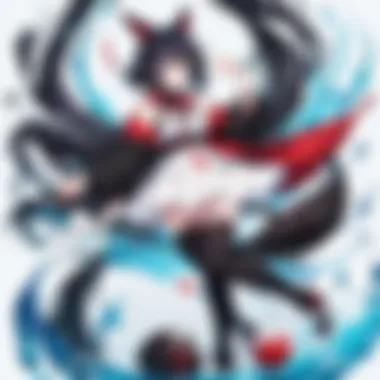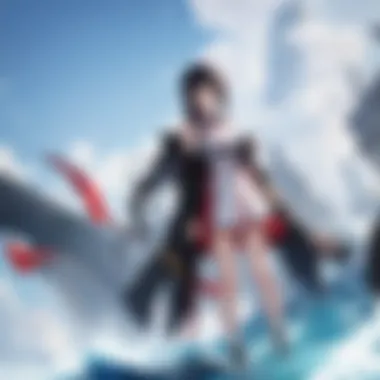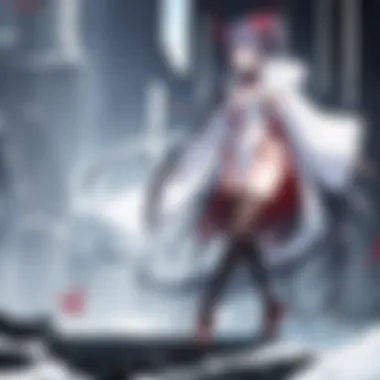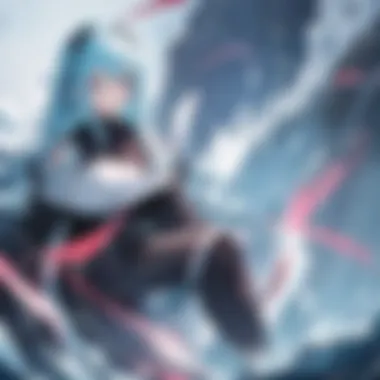Exploring Mozu: Character and Themes in Anime & Manga


Intro
In the vast landscape of anime and manga, a myriad of characters emerge, each with unique traits and narratives. One character that stands out prominently is Mozu. Its role often transcends mere presence, embodying themes that resonate deeply with viewers and readers alike. This article delves into the complexities of Mozu, investigating its significance, development, and the impact it has had on storytelling techniques.
Featured Series or Manga
Overview of the Series
Mozu appears across various series and manga. Each rendition offers a nuanced take on the character, drawing parallels while highlighting the differences that shape its identity. For instance, in KonoSuba, Mozu evolves from a simple character into a significant figure that embodies humor and depth. This transformation is crucial as it illustrates how characters can grow or regress based on their narratives.
Key Characters and Development
Among several interesting characters, Mozu often interacts with pivotal figures like Kazuma and Aqua in KonoSuba. These relationships illustrate dynamics that enrich both Mozu’s development and the overarching narrative. The contrast between Mozu’s grounded nature and the exaggerated traits of Kazuma and Aqua enhances its role, making moments of interaction both pivotal and revealing. Such developments in character relationships are central to understanding Mozu's importance in these narratives.
Character Analysis
Major Characters
Mozu is often supported by a variety of intriguing characters. For example, characters like Megumin and Darkness add layers to the storyline. The interactions shared with Mozu help to flesh out not just Mozu’s character but also highlight different facets of those involved. Their multifaceted nature serves to create richer storytelling experiences in the series.
Character Arcs and Growth
The evolution of Mozu is captured through distinct arcs that showcase transformation. In several instances, Mozu begins as a secondary figure, yet gradually takes center stage. The character's journey often reflects central themes such as friendship, sacrifice, and the quest for identity. This growth invites audiences to engage with Mozu in a more profound way, stirring discussions around its implications in narrative frameworks.
Thematic Exploration
Main Themes and Messages
Mozu represents a convergence of themes that are often explored in depth within anime and manga. Notably, themes of resilience and personal growth surface consistently. Mozu's challenges, paired with uniquely intimate moments shared with other characters, craft a narrative rich in emotional resonance and relatability. Audiences often find solace in Mozu’s experiences, drawing parallels with their own lives.
Cultural Context and Influences
The character of Mozu is not an isolated construct. It reflects broader cultural nuances present within the anime and manga landscape. Themes resonate with traditional Japanese narratives, where character growth mirrors societal expectations and personal aspirations. The cultural significance of Mozu elevates its importance beyond entertainment, providing insight into the evolving themes reflected in contemporary storytelling.
"In understanding Mozu, one begins to appreciate the intricate dance between character influence and narrative outcomes in anime and manga."
Through detailed examination, one gains insight into how Mozu's character evolves and how such figures embody core narratives in contemporary anime and manga. The exploration of Mozu provides a lens through which to understand broader storytelling practices and cultural reflections.
Intro to Mozu
Understanding Mozu is crucial for anyone deeply invested in the realms of anime and manga. This character, often multifaceted, embodies themes and narratives that resonate with various audiences. Mozu serves not only as a central figure, but also as a mirror reflecting larger societal issues and personal struggles.
By delving into Mozu's character, one uncovers layers of meaning that enhance the viewing or reading experience. These insights provide a richer context for the narratives in which Mozu appears, allowing fans to appreciate the subtleties of storytelling. Mozu's role offers a unique lens through which to explore identity, conflict, and the journey of growth within these art forms.
Definition of Mozu
Mozu can be defined in various ways, depending on the context in which it appears. Generally, Mazou represents a character archetype or motif prevalent in many narratives. It may symbolize freedom, individuality, or, conversely, the struggles of existence. In essence, it is a figure that embodies psychological complexity and existential themes. This makes Mozu an essential element in examining modern anime and manga, revealing how contemporary stories engage with age-old human dilemmas.
Historical Background
The concept of Mozu has deep historical roots. Emerging in classic literature, the character has evolved over time to adapt to changing cultural landscapes. In earlier narratives, similar figures often represented traditional virtues or societal norms. As storytelling transitioned into the modern era, Mozu began to take on more nuanced characteristics, reflecting contemporary issues such as alienation and identity crisis.
For instance, in post-war Japan, characters like Mozu reflected the pervasive feelings of loss and disconnection that many individuals experienced. The evolution of this character reveals insights into societal anxieties and aspirations throughout history. Understanding this background helps audiences appreciate the context in which Mozu operates in modern anime and manga.


Mozu in Popular Culture
The representation of Mozu in popular culture plays a crucial role in understanding its significance within anime and manga. This section examines how Mozu reflects and shapes cultural narratives, contributing to the overall themes and character developments in these mediums. The recurring motifs and the impact of Mozu resonate with audiences, providing both entertainment and deeper connections to societal issues. This dual-layered engagement enriches the viewer's experience and showcases the transformative potential of narrative in animated stories.
Mozu in Anime
In anime, Mozu often embodies various archetypes that resonate with viewers. This character frequently reflects complex themes such as identity, resilience, and the struggles faced by many individuals in a rapidly changing world. A prime example is found in the series "My Hero Academia," where a character reminiscent of Mozu grapples with the pressures of expectations and self-discovery in a society that demands excellence.
The design of Mozu characters is typically unique, often featuring signature traits that set them apart from others. These traits serve to immediately capture the audience's attention and foster an emotional connection. For instance, vibrant colors and distinct style choices can symbolize inner strength or turmoil, giving depth to their personas.
Moreover, the interactions these characters have with their environments often spark critical commentary on contemporary issues. The portrayal of Mozu can reflect societal challenges, from mental health to familial relationships. As a result, audiences not only engage with the storyline on a surface level but also reflect on their own experiences through the lens of these characters.
Mozu in Manga
In manga, Mozu's presence is similarly significant. The medium allows for greater character exploration, often providing nuanced backstories that enhance the narrative. A character like Mozu may begin as an antagonist but can gradually evolve into a protagonist through conflict resolution and personal growth. Take, for example, the character development seen in the manga "Naruto," where figures initially viewed as enemies reveal layers of complexity, leading to redemption arcs.
The artistry in manga also contributes to how Mozu is perceived. Illustrations can capture subtle emotions and themes, such as isolation or hope, conveying sentiments effectively. Panels can depict the internal struggles of a Mozu-inspired character, inviting readers to delve deeper into their psyche. This approach not only entertains but fosters empathy and understanding among the audience.
In both anime and manga, the presence of Mozu highlights a broader trend within modern storytelling, where character depth and thematic resonance are increasingly valued. This evolution signals a shift toward narratives that challenge conventional storytelling practices, inviting audiences to engage actively with the material.
Character Analysis of Mozu
The character analysis of Mozu serves as a critical avenue for examining its multidimensionality within anime and manga. By focusing on Mozu's personality traits, symbolic representations, and character evolution, we can appreciate the deeper nuances of this character in various narratives. This analysis is important because it provides insights into how Mozu encapsulates broader themes, reflects societal issues, and influences story outcomes. Understanding these layers enhances the appreciation of storytelling in anime and manga, enriching the viewer's experience.
Personality Traits
Mozu exhibits a range of personality traits that define its character arc. At the core, Mozu is portrayed as introspective and self-aware. This self-reflective nature allows Mozu to engage in deep contemplation about its place in various worlds. The character often wrestles with feelings of alienation or belonging, which resonates with many viewers.
Mozu also displays resilience. Faced with challenges, it does not shy away from adversity. Instead, it confronts obstacles head-on, showcasing determination and grit. These traits endear Mozu to audiences, as they reflect the struggle for self-acceptance and growth, relatable themes in both life and fiction.
In addition, the character often embodies empathy. This characteristic allows Mozu to form meaningful connections with others, highlighting interpersonal dynamics within different narratives. By being attuned to the feelings and needs of other characters, Mozu fosters engagement and becomes a catalyst for change within its surroundings.
Symbolic Representations
The symbolic representations of Mozu operate on multiple levels. Often, Mozu symbolizes the journey of self-discovery and the quest for identity. This is illustrated through nuanced storytelling, where Mozu's interactions and conflicts lead to revelations about itself and others.
Furthermore, Mozu may represent the theme of transformation. In many series, Mozu undergoes significant changes that mirror the internal struggles of the audience. Such changes signify growth, adaptability, and the ability to overcome life's trials. This transformation can resonate with viewers, prompting them to reflect on their own life journeys.
Additionally, Mozu can act as a lens through which social issues are explored. Issues such as mental health, belonging, and acceptance are often echoed in Mozu's storylines, providing commentary on real-world challenges. These representations add layers of meaning, making the character critical to understanding the narratives it inhabits.
Character Evolution
Character evolution is a pivotal aspect of Mozu's narrative journey. Over the course of various series, Mozu often begins as a figure grappling with uncertainty and confusion. Early episodes or chapters may showcase a character that feels lost within its environment.
As the narrative unfolds, significant events and relationships catalyze change in Mozu's demeanor and approach. It learns from its experiences, adapting and growing in response to challenges. This progression not only enhances its character depth but also allows viewers to witness a transformative journey that mirrors personal growth in their own lives.
In the final stages of its character arc, Mozu often emerges as a more complex and resilient figure. The evolution reflects a deeper understanding of its identity, often culminating in a reaffirmation of self-worth. In this way, Mozu's growth serves not just as a plot device, but as a form of inspiration, advocating the idea that change is possible and often necessary for personal fulfillment.
"Character depth in anime is not just about actions, but about the emotional resonance that connects with the audience."
Thematic Elements Associated with Mozu
The thematic elements associated with Mozu play a critical role in understanding its character within anime and manga. These elements often delve into complex issues, such as identity, conflict, and growth. Examining these themes allows fans to grasp how Mozu embodies deeper storytelling concepts and resonates with audiences.


Themes of Identity
The theme of identity is particularly essential when analyzing Mozu. The character frequently navigates various identities throughout different series, reflecting personal struggles and societal expectations. This journey often sheds light on what it means to be true to oneself in the face of external pressures. Characters might grapple with their past while attempting to forge new pathways. In many stories, this creates a relatable narrative arc that strikes a chord with viewers and readers alike.
Exploring identity is not merely a plot device. It reflects a broader discourse on self-discovery, acceptance, and the quest for belonging. For instance, interactions with other characters can highlight these struggles, emphasizing how Mozu’s identity evolves or remains influenced. Observers can see this in series where Mozu faces crucial choices and ultimately seeks to define their identity in a complex world.
Struggles and Conflict
Struggles and conflict often serve as a backdrop for Mozu’s character development. Conflict can be both internal and external, manifesting as moments of self-doubt or confrontations with adversaries. This duality adds depth to the character’s portrayal, allowing the audience to understand the nuances of their journey better.
Narratives exploring these conflicts often showcase Mozu’s humanity. They highlight moments of vulnerability, showcasing not only the strength but the fragility in the character. This contrast can resonate with individuals facing their own struggles. Fans appreciate how these elements simulate real-life challenges and the innate desire to overcome them. The conflicts faced by Mozu may not conclude neatly but reflect the often unpredictable nature of personal growth.
Resilience and Growth
Resilience and growth being closely tied to the previous themes emphasize Mozu’s ability to adapt and thrive despite setbacks. This adaptability makes the character particularly compelling across various series. It teaches valuable lessons about perseverance and the unyielding spirit necessary to confront life's challenges.
Characters showcasing resilience often inspire others to confront their hurdles. By witnessing Mozu's journey, audiences may find motivation in their own lives. The shift from struggle to strength highlights the importance of learning through adversity. Stories that explore these elements leave lasting impressions on viewers, nurturing a connection with Mozu’s character.
Mozu's Impact on Storytelling
The character Mozu holds significant weight in the landscape of anime and manga. Its influence extends beyond mere appearances, often serving as a pivotal component in the narrative structure. The exploration of Mozu's impact on storytelling highlights essential elements that contribute to character development, thematic depth, and overall plot progression. This character not only embodies attributes that resonate with audiences but also operates as a catalyst for various narrative techniques employed by creators.
Influence on Plot Development
Mozu frequently acts as a fulcrum in the plot arcs within storytelling. Through its unique positioning, key events often revolve around this character. The development of Mozu can shift the entire trajectory of the narrative, influencing key plot points and resolutions. For instance, when Mozu encounters obstacles, it can lead to turning points that redefine relationships between characters. This dynamic capability enriches the narrative and drives the overall plot forward.
- Character Motivations: The motivations attributed to Mozu often resonate with broader societal and personal themes.
- Climaxes and Resolutions: Frequently, climactic moments are orchestrated around Mozu's decisions or actions, creating a satisfying resolution that feels earned.
This influence is critical not only for creating tension but also for building a roadmap that audiences can follow. The interweaving of Mozu’s journey with the overarching narrative serves to enhance engagement and retention throughout the story.
Interactions with Other Characters
The relationships Mozu establishes with other figures in anime and manga provide deep insight into the character's multidimensionality. These interactions are more than casual encounters; they often reveal the intricacies of personality and growth. The contrasting mannerism of Mozu against other archetypes can generate rich dialogues that expose vulnerabilities.
Furthermore, Mozu's ability to influence and be influenced by others adds layers of meaning to the narrative.
- Character Dynamics: The interplay between Mozu and allies or adversaries can evoke empathy and understanding from the audience.
- Conflict Resolution: Often, the essence of conflict revolves around the interactions that Mozu has, showcasing the power of relationships in storytelling.
Through these relationships, audiences witness character evolution, which is paramount in maintaining engagement and fostering connections with viewers.
Narrative Techniques
Mozu's presence highlights various narrative techniques that creators employ to enhance storytelling. Through its character, different techniques can be observed:
- Foreshadowing: Mozu can serve as a tool for foreshadowing significant events, subtly hinting at future developments. The observations made through its perspective can build anticipation.
- Symbolism: Often, Mozu is drenched in symbolism, encapsulating complex ideas or themes that resonate throughout the series.
- Flashbacks and Backstories: Utilization of flashbacks related to Mozu not only provides context but also deepens emotional investment from the audience.
These techniques reflect the strategic complexity in storytelling, helping to establish an engaging narrative—not just for plot advancement, but for an immersive experience overall. Mozu, therefore, becomes more than a character; rather, it is a narrative device through which stories unfold rich in meaning and depth.
Comparative Analysis of Mozu Across Series
The comparative analysis of Mozu across series plays a crucial role in understanding the character's significance in both anime and manga. Evaluating how different creators interpret and portray Mozu provides insights into the underlying themes and narratives that resonate with audiences. This comparative approach not only highlights the versatility of the character but also emphasizes the influence of cultural and contextual factors in storytelling. By examining these variations, it becomes clear how Mozu adapts to fit into different narrative frameworks while still representing core ideologies.
Similar Characters in the Genre


In anime and manga, characters analogous to Mozu often share key traits such as complexity and resilience. These characters challenge norms and undergo significant development, which contributes to their relatability. For instance, characters like Yoshiko from "Bono Bono" and Yuki from "Kanon" illustrate personal struggles that resonate with audiences. Both showcase themes of identity and growth, mirroring the essence of Mozu.
Additionally, characters like Nyaruko from "Haiyore! Nyaruko: Crawling with Love!" display traits akin to Mozu, combining humor with darker themes that delve into inner conflicts. Such characters often reflect broader tropes in anime and manga where the struggle between personal desires and societal expectations manifests compellingly.
Contrasts with Other Archetypes
Contrasting Mozu with more traditional archetypes can yield enlightening perspectives on character dynamics. Unlike the typical heroic figure, which might not be as multifaceted or flawed, Mozu brings forth a sense of realism alongside idealism. For example, the archetype of the "stoic hero" lacks the vulnerability and emotional depth found in Mozu's portrayal. This contrast emphasizes the importance of flaws in character evolution.
Moreover, while characters like Shonen protagonists often embody clear moral resolutions, Mozu grapples with ambiguous situations that challenge perception. This complexity allows audiences to engage in deeper discussions about morality and ethical dimensions depicted in the narratives.
"In examining the layers of Mozu, one appreciates the intricate storytelling that transcends standard character development."
Through these nuanced comparisons and contrasts, readers gain a fuller understanding of how Mozu not only fits into the larger landscape of anime and manga characters but also how it augments and diversifies the genre itself.
Audience Reception of Mozu
Understanding how audiences receive a character like Mozu provides valuable insights into its impact in anime and manga. The discussions that arise in fandoms can shape the perception of a character and influence future storytelling. Mozu's complexity and thematic significance lead to various interpretations, enhancing its place in contemporary narratives.
Community Discussions
The online forums and social media platforms are alive with discussions about Mozu. Fans engage deeply with the character, offering diverse perspectives on its traits and actions. With platforms like Reddit and Facebook, these conversations have broadened. Here, fans can express admiration, critique, or even create theories about Mozu's role in their favorite series.
Some common discussion points include:
- Character Depth: Many fans explore what drives Mozu’s decisions.
- Narrative Impact: Fans often debate how Mozu influences the story's direction.
- Interpretation of Themes: Different interpretations of the themes associated with Mozu, such as identity and conflict, are frequently discussed.
These conversations allow fans to connect over shared interests and foster a sense of community. They also contribute to a richer understanding of the character.
Fan Art and Creativity
The creativity within the fandom surrounding Mozu is substantial. Artists frequently use their talents to express their interpretations of Mozu through various forms of art. This includes illustrations, sculptures, and digital art. Such works showcase the artistic flair inspired by the character, as well as the themes it represents.
Key points about fan art include:
- Diverse Styles: Artists depict Mozu in different artistic styles, from realistic to abstract, reflecting their personal connection to the character.
- Thematic Depictions: Many artworks highlight the themes associated with Mozu, like resilience and identity. This serves to reinforce core narrative elements.
- Distribution of Art: Websites like DeviantArt and social platforms like Instagram have become popular for sharing fan creations, allowing artists to reach a wider audience.
Fan art not only celebrates Mozu but also sparks discussions about the character and its significance in storytelling. This provides an alternative viewpoint that enriches overall appreciation.
"Mozu's portrayal in fan art is a testament to the character's impact across the anime and manga community."
Epilogue: The Legacy of Mozu
The exploration of Mozu within anime and manga reveals a character that significantly impacts storytelling and thematic development. Understanding Mozu is not merely an analysis of a character, but an insight into the techniques creators use to convey deeper messages. Mozu embodies complexities that resonate with audiences and reflect their experiences. This legacy extends beyond its immediate context in specific series, as it has shaped discussions around character depth and narrative arcs.
Summary of Insights
In summarizing the key insights from our analysis of Mozu, we find that this character represents much more than a mere plot device. The following points encapsulate its significance:
- Cultural Relevance: Mozu is deeply tied to cultural themes, often reflecting societal struggles and personal identity. This connection makes the character relatable.
- Character Development: Mozu's growth throughout various narratives exemplifies the evolution of fictional characters in anime and manga. This evolution offers a template for other characters.
- Thematic Richness: The themes associated with Mozu, such as resilience and identity, provide layers of meaning that enhance the audience’s engagement with the story.
"Mozu serves as a lens through which viewers and readers can explore their own identities and conflicts, making it a powerful symbol in modern narratives."
Future Implications for Anime and Manga
The legacy of Mozu prompts possible future implications for anime and manga. As creators continue to push boundaries, a few potential directions include:
- Diverse Character Exploration: There is a growing demand for characters like Mozu, who embrace complexity. Future narratives may include more characters that reflect intricate backgrounds and personal journeys.
- Thematic Innovation: As themes evolve, the exploration of identity, resilience, and growth will likely be central to new stories. Creators may use Mozu as a reference point for developing new narratives that challenge traditional storytelling.
- Community Engagement: The discussions surrounding Mozu in fan communities can inspire future creators. Engaging with audiences through platforms like Reddit and Facebook may lead to richer character developments that resonate on a personal level.
The legacy of Mozu is cemented not only in its own stories but in how it influences future narratives. This character offers a framework for emerging talents, motivating them to create multifaceted characters in their own works.



